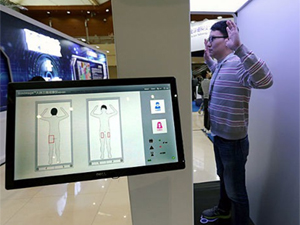



Date:13/07/18
 China has developed a 3D millimeter wave scanner for airport security checks, offering faster response and higher accuracy with less manpower needed than metal detectors, the China Daily reported Wednesday.
China has developed a 3D millimeter wave scanner for airport security checks, offering faster response and higher accuracy with less manpower needed than metal detectors, the China Daily reported Wednesday.
The scanner was designed and built by an academy affiliated to the China Aerospace Science and Industry Corp, the country's largest missile maker. It is a whole body imaging device that uses a form of electromagnetic radiation to detect objects concealed beneath a person's clothing.
The scanner is capable of detecting as many as 89 dangerous or risky items within one second, including corrosive or flammable liquids that are invisible to existing body-screening devices.
The device has a 95-percent accuracy rate, meaning most security personnel will be released from time-consuming hand searches. The scanner will greatly boost security checkpoint's efficiency while being more convenient for passengers, according to its designers.
Hu Lin, one of the scanner's designers, said that even if a passenger carries a dangerous item smaller than a coin, it will be instantly detected and displayed on the screen.
Its radiation on a human body is one thousandth that of a mobile phone signal, indicating that the security screening instrument is safe for use on humans.
As for privacy concerns, Hu said the new scanner shows a human figure on the display at the checkpoint rather than an actual image of passenger's body. Security examiners will be able to see the actual image but the passenger's face and groin will be blurred.
The Civil Aviation Administration of China recently issued a set of guidelines on the use of millimeter wave scanners at airports, encouraging the replacement of metal detectors that have been relied upon by Chinese airports for nearly three decades.
China develops 3D millimeter wave scanner for security check
 China has developed a 3D millimeter wave scanner for airport security checks, offering faster response and higher accuracy with less manpower needed than metal detectors, the China Daily reported Wednesday.
China has developed a 3D millimeter wave scanner for airport security checks, offering faster response and higher accuracy with less manpower needed than metal detectors, the China Daily reported Wednesday.The scanner was designed and built by an academy affiliated to the China Aerospace Science and Industry Corp, the country's largest missile maker. It is a whole body imaging device that uses a form of electromagnetic radiation to detect objects concealed beneath a person's clothing.
The scanner is capable of detecting as many as 89 dangerous or risky items within one second, including corrosive or flammable liquids that are invisible to existing body-screening devices.
The device has a 95-percent accuracy rate, meaning most security personnel will be released from time-consuming hand searches. The scanner will greatly boost security checkpoint's efficiency while being more convenient for passengers, according to its designers.
Hu Lin, one of the scanner's designers, said that even if a passenger carries a dangerous item smaller than a coin, it will be instantly detected and displayed on the screen.
Its radiation on a human body is one thousandth that of a mobile phone signal, indicating that the security screening instrument is safe for use on humans.
As for privacy concerns, Hu said the new scanner shows a human figure on the display at the checkpoint rather than an actual image of passenger's body. Security examiners will be able to see the actual image but the passenger's face and groin will be blurred.
The Civil Aviation Administration of China recently issued a set of guidelines on the use of millimeter wave scanners at airports, encouraging the replacement of metal detectors that have been relied upon by Chinese airports for nearly three decades.
Views: 466
©ictnews.az. All rights reserved.Similar news
- Azerbaijani project to monitor disease via mobile phones
- Innovative educational system to be improved under presidential decree
- NTRC prolongs license of two TV and radio organizations for 6 years
- Azerbaijan establishes e-registry for medicines
- Azerbaijani museum introduces e-guide
- Nar Mobile opens “Nar Dunyasi” sales and service center in Siyazan city
- International conference on custom electronic services held in Baku
- OIC secretary general to attend COMSTECH meeting in Baku
- Azerbaijan develops earthquake warning system
- New law to regulate transition to digital broadcasting in Azerbaijan
- Azerbaijani State Social Protection Fund introduces electronic digital signature
- Intellectual traffic management system in Baku to be commissioned in December
- Tax Ministry of Azerbaijan started receiving video-addresses
- World Bank recommends Azerbaijan to speed up e-service introduction in real estate
- Azerbaijan to shift to electronic registration of real estate





















